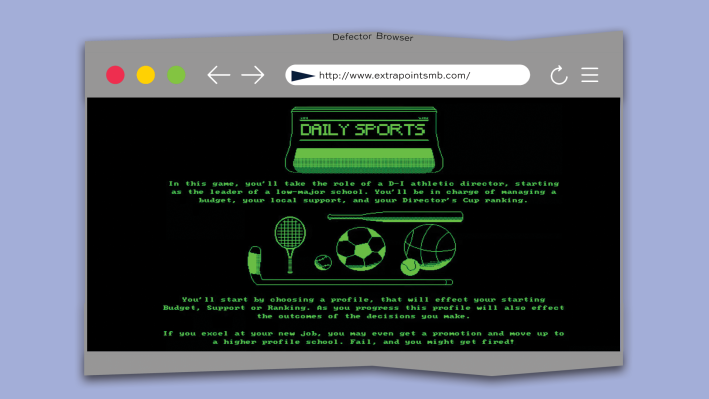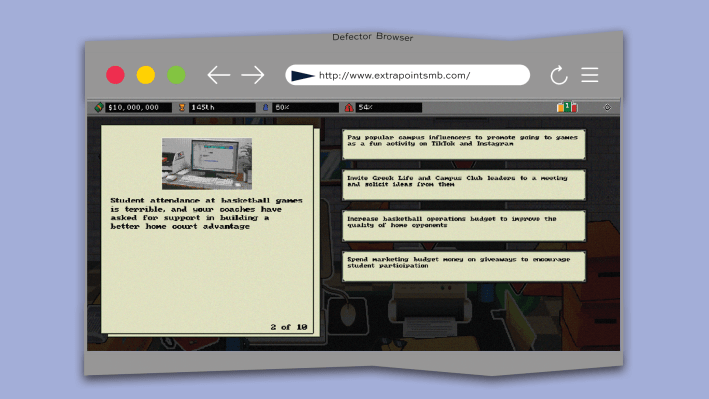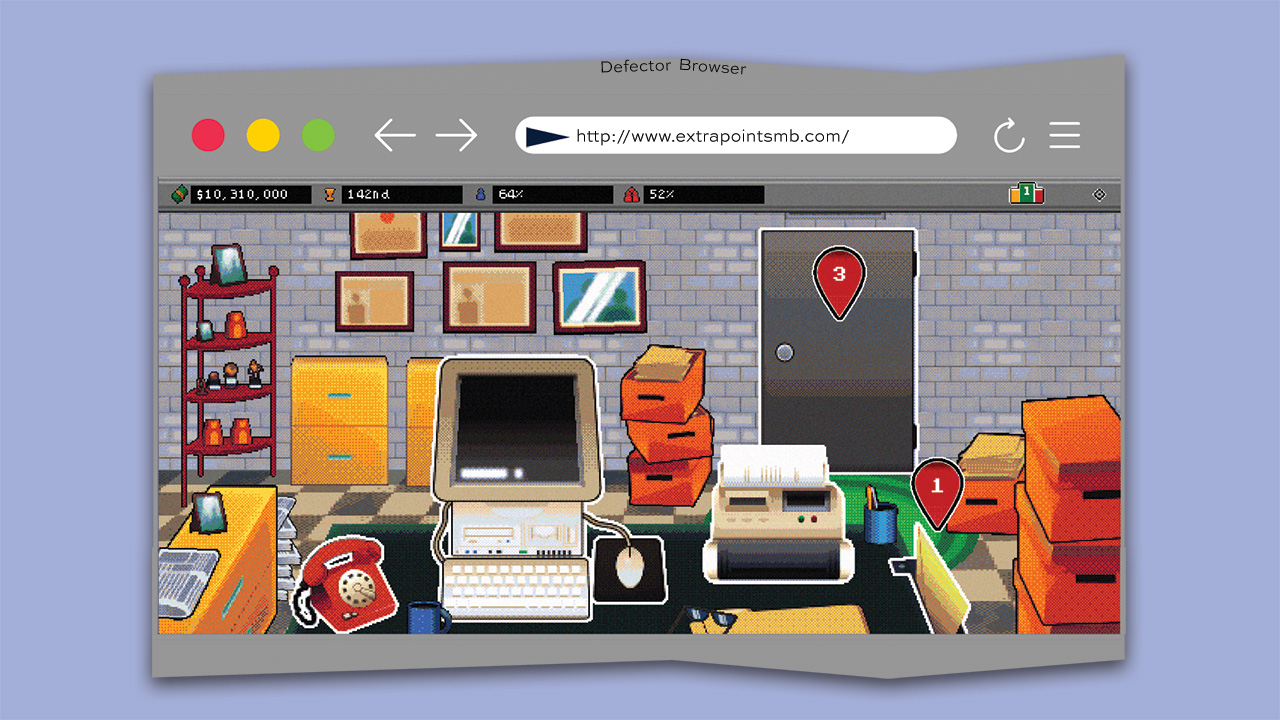Matt Brown was looking at ways to improve his work in 2022, and he settled on learning to code. His newsletter, Extra Points, covers the "off-the-field forces that shape college sports"—athletic departments, court battles, conference realignments, that kind of thing. He's basically a one-man shop, though. So Brown thought, if he learned a programming language like Python, he might be able to better report on the heaps of information he’d acquired via public records requests of public colleges.
But he also had to test those skills. He decided to do that by making a video game.
What he produced became Athletic Director Simulator 3000. It was basically 300 lines of code, all text, and the way you’d "win" was by having your athletic department purchase a bunch of subscriptions to Extra Points. "It wasn't a serious thing," he said. "I did it to just be a throwaway gag for my, you know, degenerate sicko audience, right?"
But then a funny thing happened: Several athletic directors he’d made contacts with since starting the newsletter full-time in April 2020 told him they loved it. Readers played the game—which, again, was basically done as a gag—way more than he expected. His bosses at D1.ticker, which owned the newsletter at the time, offered him a few thousand dollars to turn it into more of a real game.

What came out of that was another game of the same name, with graphics and style modeled off an old Apple IIe educational game. It was no longer just a gag.
In the game, players take control of a low-major Division I athletic program and make decisions about hirings, budgetary concerns, and other aspects of running an athletic department. The game presents players with scenarios, and they pick from a list of options. There’s a bit of randomness to it, but if a player does well they can advance to a better school. It was simple, yes, but also deceptively advanced.
It was mostly text-based for two reasons. "We were trying to shamelessly pander to the sense of nostalgia among 40-year-olds, many of whom were the professors who we were trying to sell this to as a classroom instructional aide," Brown said, "and because we didn't have a whole lot of money." Most of it was coded by Chris Hatten, a 2-D game developer and artist who does simple games for companies. I have to say, I’m impressed by his work: He managed to draw and code this game without knowing basically anything about how college sports works.
"I like the game idea," Hatten said. "I don’t like the content so much. I’m not a sports guy. I had to ask him so much. I’m like, 'What do you want this to do? Because I don’t understand it. What does this mean?' He’ll talk using all these college terms. I was like: 'I have no idea.'"
ADS3000 was successful enough they made another one, which Brown released two weeks ago—Athletic Director Simulator 4000. This one is a big expansion: There are more varied types of programs, more variables to consider, plus new scenarios facing players. And, instead of looking like an old Apple II game, it looks like something that kids might’ve played in a computer lab in the late ’80s or early ’90s.
Hatten did the artwork on the new one, too, and it looks great. I played some Apple II games as a kid, but as a 41-year-old this new version absolutely panders right to me. The presentation reminds me a lot of the versions of Carmen Sandiego and Oregon Trail that I played on IBM PS/1 computers in the early '90s. Brown’s a little younger than me, but he had those experiences too: His mom was a teacher, and she’d get games like that for free as companies tried to do market research. Other PC games of the 1980s were inspirations, too, with Brown mentioning he played a lot of the Sierra games—King's Quest, Police Quest, and the like—as a kid.
When I said I preferred the LucasArts adventure games to Sierra’s, he replied: "Well, yeah, they were easier." Ouch. But after playing ADS4000, I must admit he is right. This is more like a Sierra game, as I am terrible at it. If you do well enough at your small school, you can get hired by a bigger school. So far, I have only been able to get promoted to the second level before spinning my wheels or getting fired. Sometimes I even get fired from my first school. Here's how the scenarios in the game work:

I needed to increase attendance, so I gave the basketball team more money to schedule better teams. It worked! It cost money, but my school's reputation improved among fans and administration. Other times I've gotten this question, I tried using frat guys or online influencers to increase attendance, and it has not worked. I've also tried getting better opponents, and that hasn’t worked either! The game has no right answers.
Brown told me the game runs on weighted dice rolls, where each option has a chance of being the one that works out. Sometimes the "right" answer doesn’t work out. But he told me the scenarios and the options are realistic. "I would call people up and ask them specifically: 'This is a scenario I imagined. This is something similar that you might have experienced before. Here are three or four things we’re talking about here. Can you walk us through whether you think this weighting is is fair?' And then we might adjust some of that based on feedback."
Only D1.ticker or Extra Points subscribers can play ADS4000, and it costs $8 for a monthlong subscription to Extra Points. There are no plans currently to put it on any other platform other than the web. So maybe you won’t get the chance to play it. And, like I said, I'm bad at it. But the game is a hoot, and a lot of fun to play for a bit. I really could see sports management classes playing it a lot—maybe not with the zeal with which I played Carmen Sandiego or Oregon Trail as a kid, because they’re not preteens—and having fun with it. However, the game is no longer Brown's. Extra Points was recently purchased by THE Media, a company that also has two college football podcasts. But the intellectual property rights for ADS4000 stay with D1.ticker, the newsletter's prior owner. If Brown wants to do more, he’ll have to come up with a new idea.
"This was a little bit of my baby, right?" Brown said, adding it was not an "angry divorce" from D1.ticker. "But I learned a bunch from this project. I think it’s scratching an itch, because there’s not anything else really like it. How can I make it better? What can I do next?"






